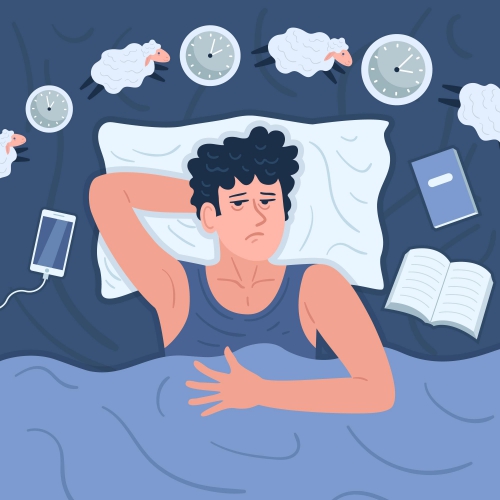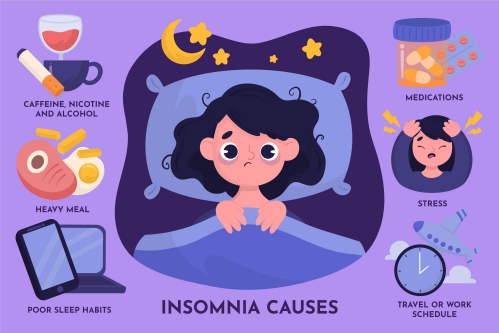What is Insomnia?
Insomnia is a condition in which a person has trouble sleeping, including difficulty falling asleep and maintaining the sleep. If you have insomnia, you may also have difficulty waking up early in the morning. The condition also causes impairment in the activities of daily living as you may also experience impairing symptoms during daytime such as fatigue, sleepiness, impaired attention and mood disturbance.
Insomnia is a very common complaint for which people go to see a doctor. It may occur before or along with other medical or psychiatric disorders. It can also occur as a response to psychological or physical stressors. Normally, most adults need around 7 hours of sleep for proper functioning. Insomnia is a condition that is more common in older adults and women. It is also more prevalent among those who are unemployed, having marital issues, widowed and those who are of lower socioeconomic status.
With the help of lifestyle changes and habits, most people can find relief from the condition. In some cases, medications may even be used.
What causes insomnia?
Insomnia may be caused by physiological and psychological stressors. It may occur as a condition on its own or associated with other conditions. Your lifestyle may also have an important impact on the quality of your sleep. Causes of insomnia include the following:
- Stressors: Problems at work, school, finances or in the family can all trigger insomnia. This is because your mind keeps thinking about all these issues all through the night making it difficult for you to fall asleep. Other stressful life events such as the death of a close relative or a trauma can also result in insomnia.
- Poor sleep hygiene: Use of screens such as mobile phones, laptops, computers or television before bed can affect your sleep. Going to bed at irregular time every day, having daytime naps and sleeping in an uncomfortable environment can cause insomnia.
- Travelling and change in time zones: This can disturb your body’s sleeping rhythm known as the circadian rhythm. This is what normally control your sleeping and waking cycle.
- Eating a heavy meal in the evening: This can result in an uncomfortable feeling when you are trying to sleep.
- Medications: Certain medications may cause insomnia as a side effect. These include some antihypertensive drugs, antidepressants or pain relief medications that contain stimulants.
- Other medical conditions: Some medical conditions may be associated with insomnia. These include anxiety disorders, post-traumatic stress disorder, depression, chronic pain, diabetes or heart diseases amongst others.
- Stimulants: Stimulants such as coffee, tea, soft drinks, nicotine, alcohol and energy drinks can prevent you from falling asleep at night.

What are the risk factors for insomnia?
The following factors may increase your risk of having insomnia:
- Being over 60 years old
- Being a woman
- Suffering from another chronic condition
 Having a mental health disorder
Having a mental health disorder- Unable to manage stress
- Being exposed to stressful events
- Having a poor sleep hygiene
What are the symptoms of insomnia?
Insomnia can present as a condition on its own or as part of another disease. It can manifest with the following symptoms:
- Poor quality of sleep
- Not being able to maintain a good sleep
- Difficulty to fall asleep
- Waking up too early
Furthermore, the lack of proper sleep can give rise to other impairing symptoms during the day including:
- Fatigue and weakness
- Impaired attention
- Poor concentration
- Social dysfunction
- Irritable mood
- Feeling sleepy during the day
- Lack of motivation to perform daily tasks
- Higher risk of having accidents or making errors at work or school
- Impulsivity
- Aggressiveness
- Anxiety
Making a diagnosis
The diagnosis of insomnia is usually made by taking a thorough clinical history followed by a complete physical examination to rule out any other possible medical conditions. Blood tests are not usually required, however they may be requested to rule out any other coexisting medical conditions.
A sleep diary may also be helpful to make the diagnosis of insomnia. This includes a detailed de ion of the sleep problem including the number of times you awaken, the duration of awakenings and since when you are having the problem. It also included your sleeping time, the duration until onset of sleep, the final time you awaken as well as times and lengths of your naps. Furthermore, it also included the other symptoms you experience during the day. All of the mentioned information above are recorded in a diary for about one or two weeks.

A sleep study, on the other hand, is a procedure which requires you to spend the night at a sleeping centre. Tests will be done recording the activities of your brain, breathing pattern, heartbeat, ocular movements and other movements in your body.
Treatment of Insomnia
Treatment of insomnia is mostly non-pharmacological. However, in some cases, medications may be prescribed. Treatment options for insomnia include the following:
- Cognitive behavioural therapy (CBT): This is usually the initial treatment option for insomnia. In most cases, CBT for insomnia is usually sufficient. This involves working with a therapist for a duration of several weeks. He/she will help you identify the factors or bad habits that may be contributing to your insomnia.
- Relaxation exercise: This may also form part of CBT for insomnia. Some relaxation exercise may help to avoid insomnia.
- Medications: In cases where CBT is not effective in the treatment of insomnia, medications may be prescribed. The choice of medications will depend on a series of factors including your age, underlying medical conditions, intake of other medications and main bothering symptoms. The main categories of medications used include benzodiazepine receptor agonists (BZRAs), dual orexin receptor antagonists (DORAs), histamine receptor antagonists and melatonin receptor agonists.
Some examples of BZRAs approved for the treatment of insomnia include quazepam, triazolam, estazolam, temazepam and flurazepam. Examples of DORAs include lemborexant and suvorexant. An examples of Histamine receptor antagonist is doxepin. The melatonin receptor agonist used is ramelteon.

Complications of insomnia
Having inadequate amount and quality of sleep may have a great impact on your general health and performance including:
- Poor performance at work or school
- Inability to concentrate
- Slow reaction time increasing the risk of accidents
- Development of psychological and mental health disorders such as depression or anxiety
- Increased risk of having a substance abuse disorder
- Increased risk of having high blood pressure or cardiovascular diseases
Prevention of insomnia
The following measures may help in the prevention or improvement of insomnia:
- It is advised to go to bed only when you are feeling sleepy
- Restrict bedroom use for sleep and sex
- Avoid napping during daytime
- Go to bed and wake up at the same time everyday
- Avoid caffeine intake after lunchtime
- Avoid alcohol consumption before going to bed
- Do not smoke in the evening
- It is recommended to exercise during the day. Avoid exercising within 2 hours before bedtime
- Limit screen time before going to sleep
- Avoid eating heavy meals before bedtime
Source:
Bonnet, M., 2020. Risk Factors, Comorbidities, And Consequences Of Insomnia In Adults.
Bonnet, M., 2020. Evaluation And Diagnosis Of Insomnia In Adults
Winkelman, J., 2020. Overview Of The Treatment Of Insomnia In Adults.



